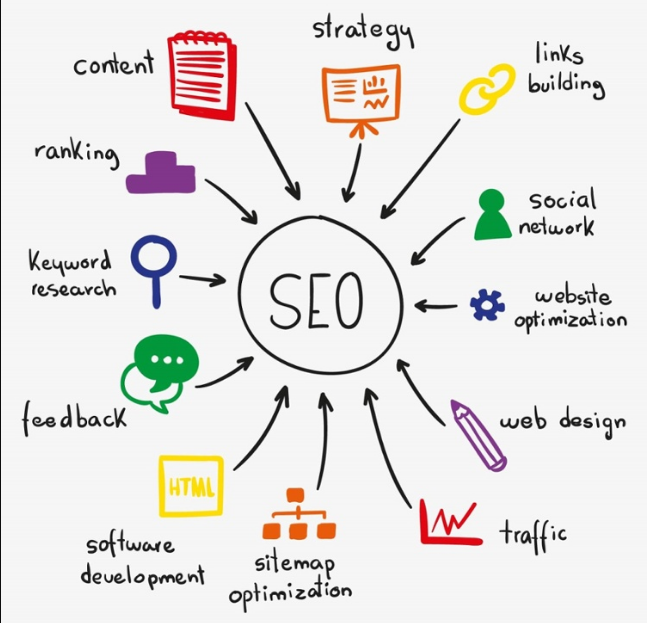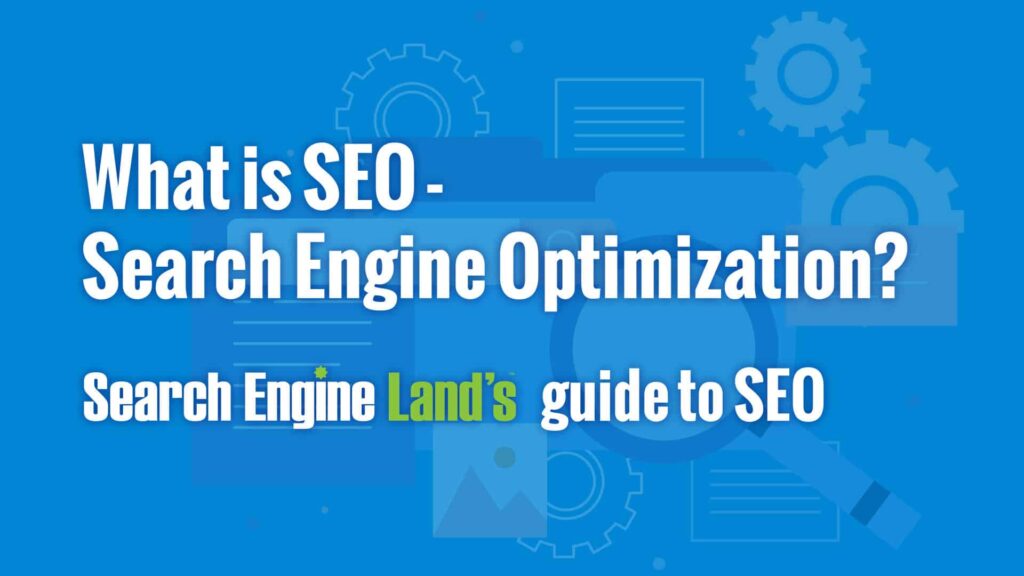SEO marketing stands for Search Engine Optimization marketing. It’s about improving website visibility on search engines.
Imagine having a great store, but it’s hidden in a back alley. SEO marketing helps move your store to the main street, where more people can find it. It’s crucial in the digital age where online presence matters. This strategy involves using keywords, quality content, and various techniques.
The goal? To rank higher on search results. SEO marketing attracts organic traffic, meaning people find your site naturally. This can boost your business without paying for ads. Understanding SEO marketing is essential for anyone looking to grow their online presence. Let’s explore its basics and why it’s a vital tool for success.
Introduction To Seo Marketing
SEO marketing is essential for any online presence. It helps websites attract visitors through organic search results. Understanding SEO marketing is crucial for businesses aiming to grow online.
What Is Seo?
SEO stands for Search Engine Optimization. It involves improving a website’s visibility on search engines like Google. Better visibility means more traffic to your site.
Importance Of Seo Marketing
SEO marketing is vital for several reasons. It increases your website’s visibility. This leads to more potential customers. High visibility in search results builds trust with users. People trust search engines. If your site ranks high, users believe your content is reliable. SEO also helps you stay ahead of competitors. A well-optimized site attracts more visitors. This can lead to higher sales and growth.
Key Seo Components
Understanding the key components of SEO is crucial for improving your website’s visibility. These components can be divided into two main categories: On-Page SEO and Off-Page SEO. Each plays a vital role in your overall SEO strategy.
On-page Seo
On-Page SEO refers to the optimization of elements within your website. These elements include:
- Title Tags: The title of your webpage. It should be concise and include your main keyword.
- Meta Descriptions: A brief summary of your webpage. This should also include your main keyword.
- Headings: Use
totags to structure your content. Ensure to include keywords in these headings. - URL Structure: Create URLs that are short and include your main keyword.
- Image Alt Text: Describe your images using keywords. This helps search engines understand the content of your images.
- Content Quality: Write engaging, informative, and unique content. Use keywords naturally and avoid keyword stuffing.
Off-page Seo
Off-Page SEO involves actions taken outside of your website. These actions help improve your site’s authority and trustworthiness. Some important Off-Page SEO techniques include:
- Backlinks: Links from other websites to your own. Quality backlinks from reputable sources improve your site’s authority.
- Social Media Engagement: Active engagement on social media platforms. Sharing your content on social media can drive traffic to your site.
- Guest Posting: Writing articles for other websites. Include a link back to your site in these posts.
- Influencer Outreach: Collaborate with influencers in your industry. Their endorsement can bring more visibility to your site.
Both On-Page and Off-Page SEO are essential for a successful SEO strategy. By focusing on these key components, you can improve your website’s search engine ranking.
Keyword Research
Keyword research is a key part of SEO marketing. It helps you understand what terms people use to find information online. By targeting these keywords, you can improve your website’s visibility. This means more people will find your content. Let’s dive into how you can find the right keywords and the tools that can help.
Finding Keywords
Start by brainstorming words related to your topic. Think about what your audience might search for. Write down these ideas. Next, expand your list by using search engines. Type in your main keywords and see what suggestions come up. These suggestions can give you new keyword ideas.
Another way to find keywords is by checking out your competitors. Look at the keywords they use. This can give you insights into what works in your industry. Note down any keywords that seem relevant to your content.
Tools For Keyword Research
Several tools can make keyword research easier. Google Keyword Planner is a popular choice. It shows search volume and competition for different keywords. This helps you understand which keywords are worth targeting.
Another useful tool is Ahrefs. It provides detailed keyword data and insights. You can see how difficult it is to rank for a keyword. This helps you choose the best keywords for your content.
SEMrush is also a great tool. It offers keyword suggestions and shows the keywords your competitors use. This can help you stay ahead in your industry.
Using these tools, you can find the best keywords for your SEO strategy. Remember to choose keywords that are relevant to your audience and content.

Credit: www.techcronus.com
Content Optimization
Content optimization is a key part of SEO marketing. It involves improving the quality and relevance of your website’s content. This helps attract and retain visitors. Two main aspects of content optimization are creating quality content and using keywords effectively.
Creating Quality Content
Quality content answers users’ questions. It provides valuable information. It is well-researched and accurate. Quality content is also engaging. It keeps readers interested. Using simple language makes it easy to read. Short paragraphs improve readability. Visuals like images or videos add value. They break up the text and make it more appealing. Always proofread your content. Ensure there are no errors. High-quality content builds trust with your audience.
Using Keywords Effectively
Keywords are words or phrases users type into search engines. Using the right keywords helps your content rank higher. Start with keyword research. Find out what your audience is searching for. Include these keywords naturally in your content. Place them in titles, headings, and body text. Avoid keyword stuffing. It can hurt your rankings. Use synonyms and related terms. This makes your content more diverse. Keywords should fit seamlessly into your writing. They should not disrupt the flow. Effective keyword use boosts your visibility.
Technical Seo
Technical SEO involves optimizing your website’s infrastructure. It focuses on the backend aspects. These include the website’s structure, mobile friendliness, and speed. This ensures search engines can crawl and index your website efficiently. Effective Technical SEO can improve your rankings and user experience.
Website Structure
A well-organized website structure is vital. It helps search engines understand your site. Ensure your site has a clear hierarchy. Use a simple URL structure. Avoid long and complex URLs.
Consider using categories and subcategories. This makes navigation easier for users. It also helps search engines find related content. Use internal links to connect your pages. This boosts the SEO value of all pages.
| Element | Best Practice |
|---|---|
| URL Structure | Keep URLs short and descriptive |
| Internal Linking | Link related content within your site |
| Site Hierarchy | Use categories and subcategories |
Mobile Friendliness
Mobile friendliness is crucial. Most users access websites on their phones. A mobile-friendly site provides a better user experience. Google also uses mobile-first indexing. This means Google primarily uses the mobile version of your site for ranking.
Ensure your site is responsive. A responsive design adapts to different screen sizes. Use large, readable fonts. Ensure buttons are easy to tap. Avoid using flash. Flash is not supported on most mobile devices.
- Use a responsive design
- Ensure text is readable
- Make buttons easy to tap
- Avoid flash elements

Credit: www.lyfemarketing.com
Link Building Strategies
Link building is an important part of SEO marketing. It helps increase your site’s authority and ranking on search engines. There are many strategies to build links. Let’s explore two of the main strategies: internal linking and external backlinks.
Internal Linking
Internal links connect one page of your website to another. They help users navigate your site. They also help search engines understand the structure of your site.
Here are some key benefits of internal linking:
- Improves user experience
- Distributes page authority
- Helps search engines index your pages
Here are some tips for effective internal linking:
- Use relevant anchor text
- Link to high-value pages
- Ensure all important pages are linked
External Backlinks
External backlinks are links from other websites to your site. They are crucial for building your site’s authority. They show search engines that your content is valuable.
Here are some ways to get external backlinks:
- Guest blogging
- Creating shareable content
- Building relationships with influencers
Remember, quality matters more than quantity. Focus on getting links from reputable sites.
Here are some tips for obtaining high-quality external backlinks:
- Reach out to industry experts
- Provide valuable content
- Monitor your backlink profile
Seo Analytics
SEO Analytics is the backbone of any successful SEO marketing strategy. It involves collecting and analyzing data to understand the performance of your website. By leveraging SEO Analytics, you can make informed decisions to improve your search engine rankings.
Tracking Performance
Tracking performance is crucial in SEO Analytics. It helps you understand how well your website is doing. You can see which keywords are driving traffic. You can identify the pages that attract the most visitors. This data shows where you need to improve and what is working well.
Using Seo Tools
Using SEO tools can make tracking performance easier. Tools like Google Analytics and SEMrush provide valuable insights. They help you track metrics such as bounce rate and organic traffic. These tools also offer keyword analysis and backlink tracking. By using these tools, you can optimize your SEO efforts effectively.

Credit: www.linkedin.com
Future Of Seo Marketing
The future of SEO marketing is dynamic and always evolving. As technology advances, so do the strategies needed to stay at the top of search engine results. Understanding emerging trends and adapting to changes are crucial for success in this field. Let’s explore what lies ahead for SEO marketing.
Emerging Trends
Several new trends are shaping the future of SEO marketing. Voice search is becoming more popular. People use devices like Alexa and Siri to search the web. This means optimizing for natural language and long-tail keywords.
Another trend is the rise of artificial intelligence (AI). Search engines like Google use AI to understand user intent better. AI helps deliver more relevant search results. Marketers must focus on user experience and content quality.
Video content is also gaining importance. Videos can improve engagement and keep users on a site longer. This can positively affect search rankings. Including video in your content strategy is a smart move.
Adapting To Changes
SEO marketing is not static. Algorithms change frequently. Marketers must stay updated with these changes. They need to adapt their strategies accordingly. Here are a few ways to keep up:
- Follow industry blogs and news sites.
- Attend webinars and conferences.
- Join SEO forums and communities.
Another way to adapt is by focusing on mobile optimization. More users access the web from mobile devices. A mobile-friendly site is crucial for good rankings. Ensure your site loads quickly and is easy to navigate on a phone.
Finally, prioritize user experience (UX). Search engines value sites that offer a great UX. This includes fast loading times, easy navigation, and high-quality content. Improving UX can lead to better search rankings.
Frequently Asked Questions
What Is Seo Marketing?
SEO marketing involves optimizing your website to rank higher on search engines. This increases organic traffic and visibility.
How Does Seo Marketing Work?
SEO marketing works by improving your website’s content, structure, and backlinks. These factors help search engines understand and rank your site better.
Why Is Seo Important?
SEO is important because it increases your website’s visibility. Higher visibility leads to more traffic, potential customers, and sales.
What Are Seo Best Practices?
SEO best practices include keyword research, high-quality content, mobile optimization, and building backlinks. These practices help improve your search engine rankings.
Conclusion
SEO marketing helps your business grow online. It attracts more visitors. These visitors can become customers. Understanding SEO makes your website more visible. This leads to better engagement. Better engagement means more sales. SEO is a long-term strategy. It requires patience and consistency.
Keep learning and adapting. This will ensure success. Start optimizing today. Your business will thank you.




